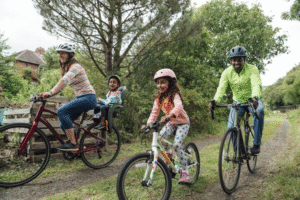why gratitude may give your child a positive outlook on life
children who learn to express gratitude experience positive mental health benefits

If you want to raise a grateful child, teaching them to say “thank you” is only one small part of the equation. It’s difficult for young children to know what to be thankful for if they haven’t been told. Teaching them how to notice things they should appreciate may help them become more grateful over time.
Children who learn to express gratitude without being prompted are more likely to experience positive mental health benefits, such as:
- Increased happiness levels
- Feeling greater enjoyment while participating in different experiences
- Deepening relationships with friends and relatives
- Feeling a connection to others in the community
- Coping with hardship or adversity more easily
- Feeling more optimistic and hopeful
How to Teach Children About Gratitude
You may help your child understand the concept of gratitude more easily if you talk aloud to share your thought process when you are thankful about something:
· Noticing something you’re thankful for. Whether you’re thankful for the friendship you have with someone or for the beauty of a sunset, put to words why this is something you are grateful for.
· Think about why you’re grateful. Explain to your child why a special friendship or a beautiful sunset is something you appreciate.
· Consider your emotions. Talk through this thought process with your child, to let them know your feelings. For example, you might say, “I can’t believe my friend remembered I wanted that funny mug we saw together at the store. She must have gone back to get it for me, which makes me feel special because she went out of her way for me.”
· Think about how to express your gratitude. Ask your child how you might thank a friend for a gift or for being a good friend. Also talk about ways to be grateful for things when you can’t thank someone directly, like when you appreciate the beauty of nature.
Ways children can express gratitude

With your ongoing guidance, your child can learn to notice the positives in their life, appreciate them and express their gratitude. Eventually, your child should notice and express gratitude on their own, instead of needing prompting. To help make gratitude second nature for your child, try different activities together:
- Write a thank you note (or draw a picture) for kind gestures or for gifts received.
- Call someone to thank them or thank them in person.
- Go around the dinner table every night to share something you’re grateful for that day.
- Every day, write something you’re thankful for on a slip of paper and put it in a jar, then periodically read what you’ve written.
- Keep a gratitude journal – every night, write three things you’re thankful for that day; flip through the journal sometimes as a reminder of the positives in your life.
Download our On Our Sleeves Gratitude Journal instructions and have your child decorate a notebook with stickers, glitter, photos, etc., and write down and/or draw at least one thing they are thankful for every day throughout the month. Share their ideas by using #OnOurSleeves on social media.
The mission of On Our Sleeves is to provide every community in America access to free, evidence-informed educational resources necessary for breaking stigmas about child mental health and educating families and advocates. For more information, visit OnOurSleeves.org.
care that goes above and beyond
Because every child deserves care that goes above and beyond, Dayton Children’s provides compassionate, expert care for kids of all ages. Find a provider, schedule an appointment, or learn more about conditions we treat today.




